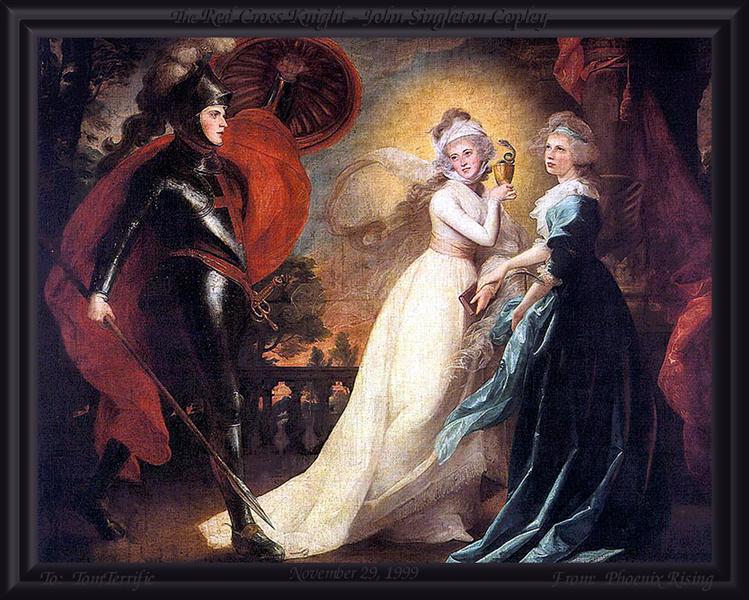Opis
John Singleton Copley’s painting “The Red Cross Knight” (1793) stands as a powerful testament to the artist’s skill in creating a portrait that is not only technical in its execution, but also deeply evocative in its symbolism and the narrative it carries. Copley, best known for his mastery of portraiture and his painting style that combines realism and emotion with classical composition, succeeds in merging aspects of the classical artistic tradition with more contemporary elements of his time.
The composition of the painting is masterfully centered on the figure of the knight, who stands erect and in a determined pose. Symbolizing the ideal of the Christian hero, this knight is dressed in shining armor that reflects the light, accentuating his role as a brave and honorable warrior. The Red Cross that adorns his chest not only indicates his faith and commitment, but can also be interpreted as a representation of struggle and sacrifice in the name of a greater cause. This symbolic element is placed in such a way that it immediately captures the viewer's attention and establishes the significance of the character.
Copley's palette in this work is rich and varied, dominated by warm tones that evoke a sense of plenitude and nobility. The subtle nuances of the colors in the knight's armor, cloak, and the background of a natural landscape create a visual tension that is intriguing. Copley employs an effective contrast between the dark tones of the knight's clothing and the lighter tones that can be seen in the surroundings, further highlighting the main figure.
Through his mastery of light and shadow, Copley gives the figure of the knight an almost sculptural presence. The direction of the light, which seems to come from a point outside the composition, envelops the figure in a halo that evokes an almost divine sense, reinforcing the idea of the knight as a hero not only earthly, but also heavenly. This use of lighting is characteristic of a more emotional and dramatic approach seen in the artist's work, which distinguishes him from those who preceded him.
Although “The Knight of the Red Cross” does not include other notable characters in the scene, the natural surroundings and the dew of nature surrounding the figure adorn the work, suggesting a broader context for the knight’s exploits. Looking closer, the viewer can appreciate the minute details of the landscape that accompany the hero, perhaps symbolizing the challenge of the natural environment that he must face.
Copley, whose work was significant in the development of American portraiture and neoclassicism, manages to situate this painting at the crossroads of the epic and the formal. Although the artist is best known today for his portraits, “The Red Cross Knight” offers us a glimpse into his ability to address more narrative and mythic themes, reflecting the romantic ideal of heroism that resonated in the political and cultural context of the late 18th century.
In short, “The Red Cross Knight” is more than just a representation. It is a work that embodies the spirit of an era in which idealism and valor were celebrated with fervour. Through his masterful handling of colour, light and composition, Copley does not simply form an image, but weaves a narrative that invites introspection about what it means to be a hero. The technical and emotional skill he displays in this work continues to resonate with the contemporary viewer, confirming its place in art history.
KUADROS ©, a famous painting on your wall.
Hand-made oil painting reproductions, with the quality of professional artists and the distinctive seal of KUADROS ©.
Painting reproduction service with satisfaction guarantee. If you are not completely satisfied with the replica of your painting, we will refund 100% of your money.

